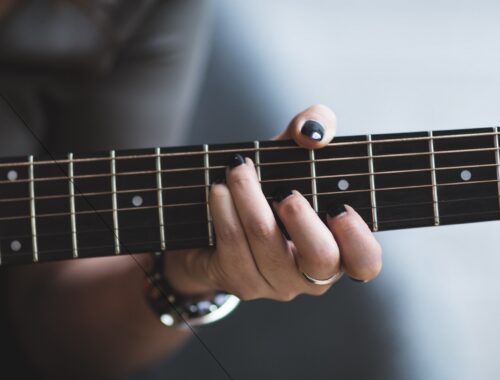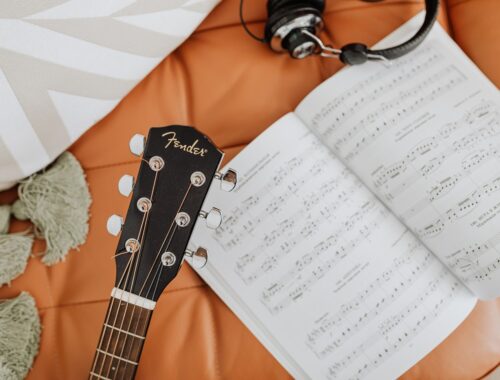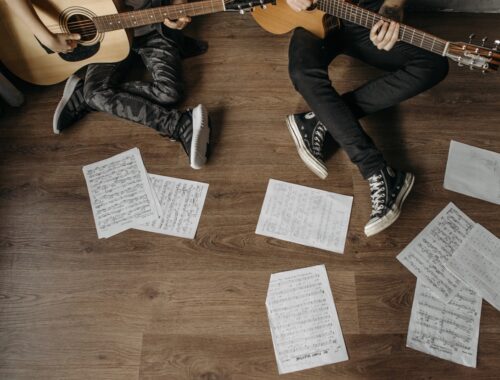Record Yourself Playing
Ways Self Recording Will Improve Your Guitar Playing
If you’re serious about improving your guitar playing, self-recording is one of the most effective tools at your disposal. Whether you’re a beginner or an experienced player, recording yourself can help you identify weaknesses in your technique, refine your playing style, and ultimately become a better musician. In this article, we’ll explore some of the ways self-recording can improve your guitar playing, and offer some tips on how to get the most out of your recording sessions.
1. Identify and Correct Technique Issues
One of the biggest benefits of self-recording is that it allows you to listen back to your playing and identify any technique issues that may be holding you back. For example, you may notice that you’re playing certain chords or notes out of tune, or that your timing is inconsistent. By pinpointing these issues, you can then work on correcting them through targeted practice exercises.
Additionally, self-recording can help you develop better finger placement and hand positioning. When you watch yourself play on video, you can identify areas where your fingers are not landing in the correct positions, or where your wrist is not in the optimal position for playing. By making adjustments based on what you see on video, you can work on improving your playing mechanics and building a stronger foundation for your playing.
2. Monitor Progress Over Time
Another advantage of self-recording is that it allows you to monitor your progress over time. By regularly recording your playing, you can compare your recordings from different points in time to see how your playing has improved. This can be incredibly motivating, as it provides tangible evidence of the progress you’re making and can help you stay committed to your practice routine.
In addition, monitoring your progress over time can help you identify areas where you’re improving more quickly, as well as areas where you may be stagnating. By identifying these areas, you can adjust your practice routine accordingly to ensure that you’re continually challenging yourself and making progress.
3. Develop a Critical Ear
Recording yourself also helps develop a critical ear, which is an essential skill for any musician. When you listen back to your recordings, you’re forced to evaluate your playing objectively and identify areas where you need to improve. This skill can be applied to other areas of your musical development, such as when you’re listening to other musicians or evaluating your own compositions.
In addition, developing a critical ear can help you develop a better sense of timing, rhythm, and overall musicality. As you listen back to your recordings, you’ll start to notice areas where your timing is off or where your playing lacks musicality. By working on these areas, you can become a more well-rounded musician and develop a stronger sense of your own musical voice.
4. Experiment with Different Styles and Techniques
Recording yourself also provides an opportunity to experiment with different styles and techniques. For example, you can try playing a song in a different key or with a different strumming pattern. By recording yourself and listening back to the results, you can get a better sense of how these changes affect your playing and how they can be incorporated into your overall playing style.
In addition, recording yourself can also help you develop your improvisational skills. By recording a backing track and then improvising over it, you can experiment with different scales, modes, and phrasing techniques. By listening back to your recordings, you can identify areas where you’re particularly strong and work on incorporating those elements into your overall playing style.
5. Share Your Playing with Others
Finally, self-recording can provide an opportunity to share your playing with others. By posting your recordings online or sharing them with friends and family, you can receive feedback and encouragement from others. This can be incredibly motivating and can help you stay committed to your practice routine.
In addition, sharing your recordings can also help you develop your performance skills . By recording yourself and listening back to your performances, you can identify areas where you may be nervous or where your playing may be affected by the pressure of performing. By working on these areas and developing your performance skills, you can become a more confident and engaging performer.
Tips for Self-Recording
Now that we’ve explored some of the ways self-recording can improve your guitar playing, let’s look at some tips for getting the most out of your recording sessions:
- Use a Quality Recording Device: To get the most accurate representation of your playing, it’s important to use a quality recording device. This could be a dedicated microphone, a digital recorder, or even your smartphone. Whatever device you choose, make sure it can capture your playing accurately and in high quality.
- Record in a Quiet Space: To minimize background noise and ensure that your recordings are clear and focused, try to record in a quiet space. This could be a dedicated music room, or simply a room where you can close the door and minimize outside noise.
- Use Headphones: When you’re recording, it’s important to use headphones to monitor your playing. This allows you to hear the nuances of your playing and make adjustments as necessary.
- Record Regularly: To get the most out of your recording sessions, try to record regularly. This could be once a week, or even once a day. By recording regularly, you’ll be able to monitor your progress and identify areas where you need to improve.
- Listen Back Critically: When you listen back to your recordings, do so with a critical ear. Try to identify areas where your playing could be improved, and work on those areas in your practice routine.
Self-recording is a powerful tool for improving your guitar playing. By identifying technique issues, monitoring your progress, developing a critical ear, experimenting with different styles and techniques, and sharing your playing with others, you can become a more well-rounded and confident musician. So next time you pick up your guitar, consider recording yourself and using the tips in this article to get the most out of your practice sessions.
You May Also Like

Practice Fingerpicking Techniques For Guitar
April 21, 2023
How to Read Guitar Tablature: A Beginner’s Guide
August 8, 2023


